常用口语(Colloquial English)
英语口语和书面语语体特征比较
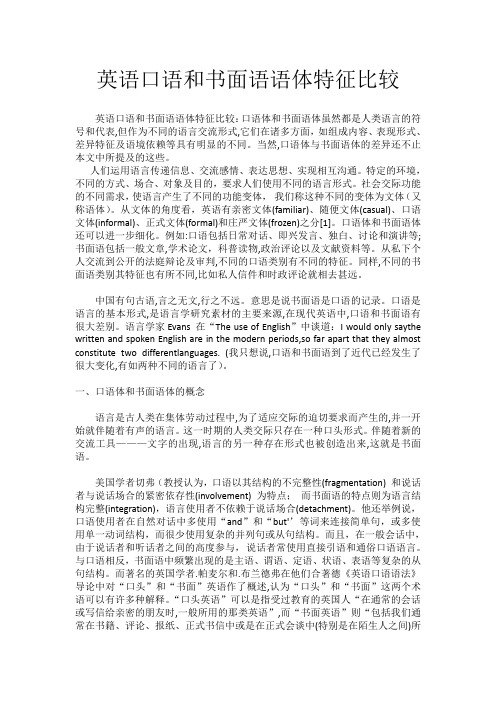
英语口语和书面语语体特征比较英语口语和书面语语体特征比较:口语体和书面语体虽然都是人类语言的符号和代表,但作为不同的语言交流形式,它们在诸多方面,如组成内容、表现形式、差异特征及语境依赖等具有明显的不同。
当然,口语体与书面语体的差异还不止本文中所提及的这些。
人们运用语言传递信息、交流感情、表达思想、实现相互沟通。
特定的环境,不同的方式、场合、对象及目的,要求人们使用不同的语言形式。
社会交际功能的不同需求,使语言产生了不同的功能变体,我们称这种不同的变体为文体(又称语体)。
从文体的角度看,英语有亲密文体(familiar)、随便文体(casual)、口语文体(informal)、正式文体(formal)和庄严文体(frozen)之分[1]。
口语体和书面语体还可以进一步细化。
例如:口语包括日常对话、即兴发言、独白、讨论和演讲等;书面语包括一般文章,学术论文,科普读物,政治评论以及文献资料等。
从私下个人交流到公开的法庭辩论及审判,不同的口语类别有不同的特征。
同样,不同的书面语类别其特征也有所不同,比如私人信件和时政评论就相去甚远。
中国有句古语,言之无文,行之不远。
意思是说书面语是口语的记录。
口语是语言的基本形式,是语言学研究素材的主要来源,在现代英语中,口语和书面语有很大差别。
语言学家Evans 在“The use of English”中谈道:I would only saythe written and spoken English are in the modern periods,so far apart that they almost constitute two differentlanguages. (我只想说,口语和书面语到了近代已经发生了很大变化,有如两种不同的语言了)。
一、口语体和书面语体的概念语言是古人类在集体劳动过程中,为了适应交际的迫切要求而产生的,并一开始就伴随着有声的语言。
英语口语练习双人对话
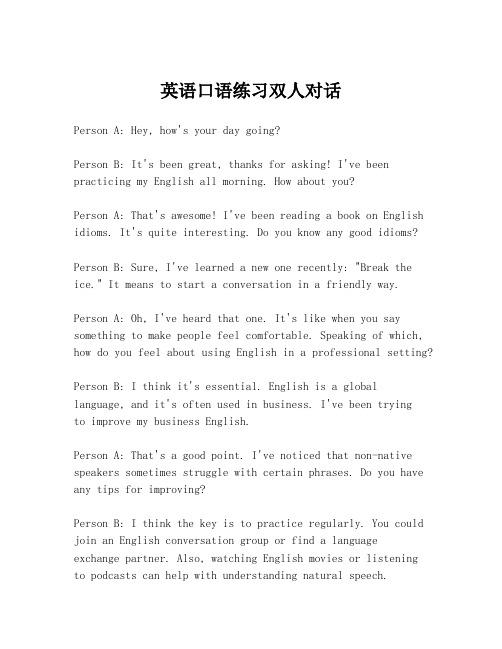
英语口语练习双人对话Person A: Hey, how's your day going?Person B: It's been great, thanks for asking! I've been practicing my English all morning. How about you?Person A: That's awesome! I've been reading a book on English idioms. It's quite interesting. Do you know any good idioms?Person B: Sure, I've learned a new one recently: "Break the ice." It means to start a conversation in a friendly way.Person A: Oh, I've heard that one. It's like when you say something to make people feel comfortable. Speaking of which, how do you feel about using English in a professional setting?Person B: I think it's essential. English is a global language, and it's often used in business. I've been tryingto improve my business English.Person A: That's a good point. I've noticed that non-native speakers sometimes struggle with certain phrases. Do you have any tips for improving?Person B: I think the key is to practice regularly. You could join an English conversation group or find a language exchange partner. Also, watching English movies or listeningto podcasts can help with understanding natural speech.Person A: I agree. I've been using language learning apps,and they're quite helpful. What about you? Do you use anytools to practice?Person B: Yes, I've been using a language exchange app whereI can chat with native speakers. It's a great way to get feedback and learn colloquial expressions.Person A: That sounds like a good strategy. I've also found that writing in English can be challenging. Do you have any advice for improving writing skills?Person B: Reading extensively is crucial. It helps you to understand sentence structures and vocabulary. Also, writing regularly, like keeping a journal, can be very beneficial.Person A: I'll definitely give that a try. By the way, how do you handle the stress of speaking in front of a group?Person B: It can be nerve-wracking, but I find thatpreparation helps a lot. I usually practice what I'm going to say beforehand and try to relax by taking deep breaths.Person A: That's a good approach. I'll remember that. Thanks for the conversation, it's been really helpful.Person B: No problem, it's been a pleasure talking with you too. Let's do this again soon!Person A: Absolutely, looking forward to it. Have a great day!Person B: You too! Cheers!。
大学生情绪表达的口语词频研究
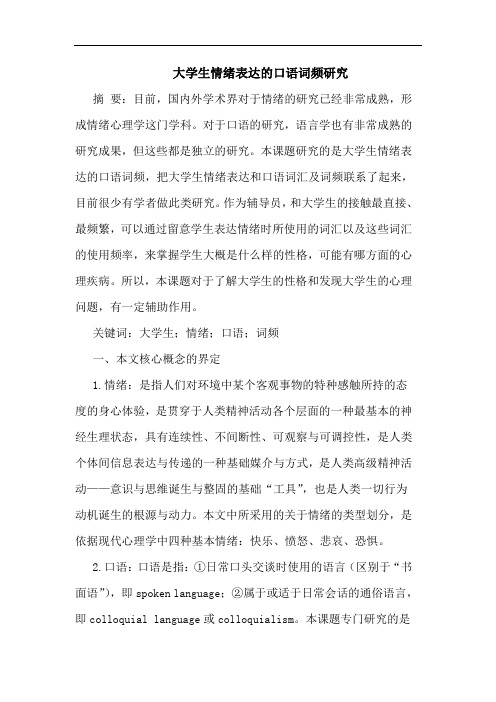
大学生情绪表达的口语词频研究摘要:目前,国内外学术界对于情绪的研究已经非常成熟,形成情绪心理学这门学科。
对于口语的研究,语言学也有非常成熟的研究成果,但这些都是独立的研究。
本课题研究的是大学生情绪表达的口语词频,把大学生情绪表达和口语词汇及词频联系了起来,目前很少有学者做此类研究。
作为辅导员,和大学生的接触最直接、最频繁,可以通过留意学生表达情绪时所使用的词汇以及这些词汇的使用频率,来掌握学生大概是什么样的性格,可能有哪方面的心理疾病。
所以,本课题对于了解大学生的性格和发现大学生的心理问题,有一定辅助作用。
关键词:大学生;情绪;口语;词频一、本文核心概念的界定1.情绪:是指人们对环境中某个客观事物的特种感触所持的态度的身心体验,是贯穿于人类精神活动各个层面的一种最基本的神经生理状态,具有连续性、不间断性、可观察与可调控性,是人类个体间信息表达与传递的一种基础媒介与方式,是人类高级精神活动——意识与思维诞生与整固的基础“工具”,也是人类一切行为动机诞生的根源与动力。
本文中所采用的关于情绪的类型划分,是依据现代心理学中四种基本情绪:快乐、愤怒、悲哀、恐惧。
2.口语:口语是指:①日常口头交谈时使用的语言(区别于“书面语”),即spoken language;②属于或适于日常会话的通俗语言,即colloquial language或colloquialism。
本课题专门研究的是大学生情绪表达的口语词频,简单地说,就是研究现代大学生发泄情绪时所使用的口语词汇的频率。
例如,现在大学生使用频率极高的“我晕”“烦”“不爽”等,这些几乎已经成为大学生情绪表达的标准用语。
本课题的研究重点就是这些词汇的使用频率及潜在原因。
3.词频:词频(term frequency)指的是某一个给定的词语在一定范围的语料库中出现的次数。
目前英文词频统计软件较多,例如rost英文词频统计v4.0.4.2,而中文词频统计软件目前很少。
本课题主要采用调查问卷形式采集数据,然后人工统计数据。
英语口语的portfolio
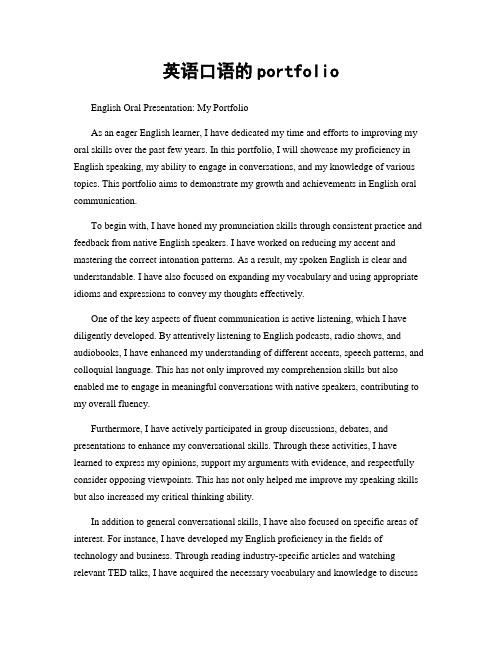
英语口语的portfolioEnglish Oral Presentation: My PortfolioAs an eager English learner, I have dedicated my time and efforts to improving my oral skills over the past few years. In this portfolio, I will showcase my proficiency in English speaking, my ability to engage in conversations, and my knowledge of various topics. This portfolio aims to demonstrate my growth and achievements in English oral communication.To begin with, I have honed my pronunciation skills through consistent practice and feedback from native English speakers. I have worked on reducing my accent and mastering the correct intonation patterns. As a result, my spoken English is clear and understandable. I have also focused on expanding my vocabulary and using appropriate idioms and expressions to convey my thoughts effectively.One of the key aspects of fluent communication is active listening, which I have diligently developed. By attentively listening to English podcasts, radio shows, and audiobooks, I have enhanced my understanding of different accents, speech patterns, and colloquial language. This has not only improved my comprehension skills but also enabled me to engage in meaningful conversations with native speakers, contributing to my overall fluency.Furthermore, I have actively participated in group discussions, debates, and presentations to enhance my conversational skills. Through these activities, I have learned to express my opinions, support my arguments with evidence, and respectfully consider opposing viewpoints. This has not only helped me improve my speaking skills but also increased my critical thinking ability.In addition to general conversational skills, I have also focused on specific areas of interest. For instance, I have developed my English proficiency in the fields of technology and business. Through reading industry-specific articles and watching relevant TED talks, I have acquired the necessary vocabulary and knowledge to discussthese topics confidently. This has not only expanded my overall language skills but also prepared me for future career opportunities.Moreover, I have sought opportunities to engage in English-speaking environments, both online and offline. I have participated in language exchange programs, where I have conversed with native English speakers and exchanged cultural insights. These interactions have enabled me to apply my language skills in real-life situations and develop a deeper understanding of different cultures.Lastly, keeping a record of my language journey has been vital to monitor my progress and identify areas for improvement. I maintain a journal of new words, phrases, and expressions, which I review regularly. Additionally, I record my conversations and presentations to self-assess my fluency, pronunciation, and clarity. Through this reflective practice, I can identify my strengths and weaknesses and adjust my learning strategies accordingly.In conclusion, my English oral portfolio showcases my growth and achievements in speaking English. From improving my pronunciation to participating in conversations and developing knowledge in various topics, I have emerged as a confident and proficient communicator. Through continuous practice, active listening, and engagement in diverse environments, I have cultivated a wide range of conversational skills. This portfolio demonstrates my commitment to enhancing my English oral proficiency and my readiness for future opportunities where effective oral communication is essential.。
英语口语-基本功100句英文版
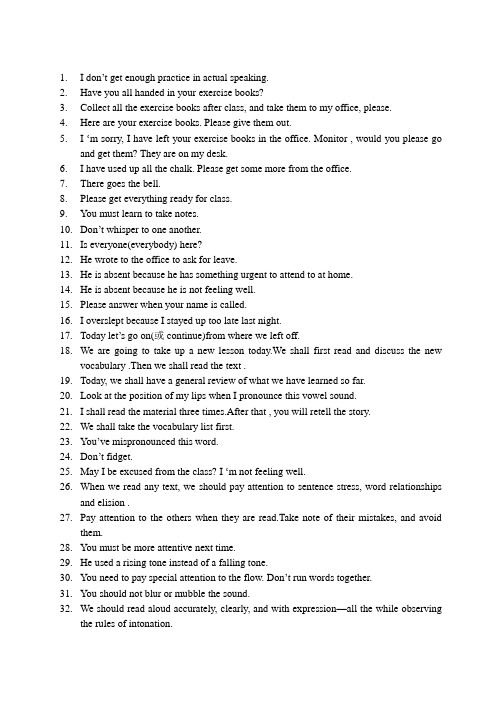
1.I don‟t get enough practice in actual speaking.2.Have you all handed in your exercise books?3.Collect all the exercise books after class, and take them to my office, please.4.Here are your exercise books. Please give them out.5.I …m sorry, I have left your exercise books in the office. Monitor , would you please goand get them? They are on my desk.6.I have used up all the chalk. Please get some more from the office.7.There goes the bell.8.Please get everything ready for class.9.You must learn to take notes.10.Don‟t whisper to one another.11.Is everyone(everybody) here?12.He wrote to the office to ask for leave.13.He is absent because he has something urgent to attend to at home.14.He is absent because he is not feeling well.15.Please answer when your name is called.16.I overslept because I stayed up too late last night.17.Today let‟s go on(或continue)from where we left off.18.We are going to take up a new lesson today.We shall first read and discuss the newvocabulary .Then we shall read the text .19.Today, we shall have a general review of what we have learned so far.20.Look at the position of my lips when I pronounce this vowel sound.21.I shall read the material three times.After that , you will retell the story.22.We shall take the vocabulary list first.23.You‟ve mispronounced this word.24.Don‟t fidget.25.May I be excused from the class? I …m not feeling well.26.When we read any text, we should pay attention to sentence stress, word relationshipsand elision .27.Pay attention to the others when they are read.Take note of their mistakes, and avoidthem.28.You must be more attentive next time.29.He used a rising tone instead of a falling tone.30.You need to pay special attention to the flow. Don‟t run words together.31.You should not blur or mubble the sound.32.We should read aloud accurately, clearly, and with expression—all the while observingthe rules of intonation.33.Don‟t slur while you read. Pronounce each syllable distinctly.34.Pay attention to your intonation and pronunciation.35.What is the central idea of this essay?36.I‟ll read the test through(once), and then explain the difficult point (或parts).37.I‟ll read the whole passage over first ,and then ,go through it slowly, sentence bysentence .38.This paragraph contains a very good portrayal. I hope you will learn it by heart.39.Don‟t hesitate to ask me if anything is not clear to you .40.Say it again, please. I didn‟t quite catch the last part.41.I‟m awfully sorry, but I didn‟t understand that sentence.42.You read much better now than before. Keep it up.43.Please come to me if you don‟t(quite) understand. I‟ll be in the office after class.44.Write down your questions, and give them to me beforehand.45.I‟m going to ask you questions on the text.46.Now, I shall ask you a few questions to see how well you know the lesson.e the third person when you answer this question, please.48.Who will volunteer to answer this question?49.Please listen carefully to see his answer is correct.50.When you answer a question, you must keep to the point.51.Speak plainly, please.52.Well done.53.Can you analyse the sentence “They always help each other”?54.Don‟t use the same words, the same structure or the same patterns too often in yourretelling.55.You didn‟t do very well this time. Try to do better next time.56.Please change the text into the third person, and make other necessary changes.57.Your English is not colloquial enough.58.Each person must come up with five questions on the picture.59.Do you know what‟s wrong with this sentence?60.Yes, you‟re right. He didn‟t translate the third sentence correctly.61.His translation is not faithful enough to the original.62.Your tenses are slipping. Watch out for your tenses.63.Who can give a better translation of this sentence?64.I‟m sure other students have a lot to say, but time is about up. We have to stop here.65.Can you give the comparative and superlative degrees(forms) of this adjective?66.Please give a synonym and antonym for this word.67.Can you identify the part of speech of this word?68.What are the past form and past participle of this verb?69.Now, I‟ll see how well you have done today.70.You didn‟t recite it smoothly.71.Construct dialogues according to the model.72.You should pay more attention to your penmanship.73.He didn‟t pay enough attention to the agreement of the subject and the predicate.74.You misspelled the word.75.I can‟t quite catch the pronunciation.76.Please pay attention to the stress.77.You do not pronounce the (p) sound very well. You need more practice.78.Who can point out the subject, predicate and object in this sentence?79.Can you tell me what kind of clause this is?80.What is the function of this word in the sentence?81.The predicate verb must agree with its subject in person number.82.This sentence is in the active voice. Can you change it into the passive voice?83.This sentence is in inverted order. Can you change it into regular order?84.Now, we shall have our conversation class.85.Start the sentence with a capital letter.86.The dictation is over. I‟ll give you five minutes to go over your work once more.87.Time is up. Hand in your exercise books.88.Indent the first line of each paragraph.89.You should not scribble.90.Your handwriting is excellent. Keep ig up.91.I‟m sorry to have kept you so long.92.Let‟s call it a day.(Shall we call it a day?)93.Your homework is too messy. Besides, there are many mistakes. You must do it again.94.Rewrite the story in the first person.95.Try to imitate the tape, please.96.Be ready to retell the story.97.Talk very distinctly but naturally.98.Before the exam, we shall have two weeks for a general review.99.You‟ve made considerable progress.100.Class (is) dismissed.。
ket英语口语话题范文
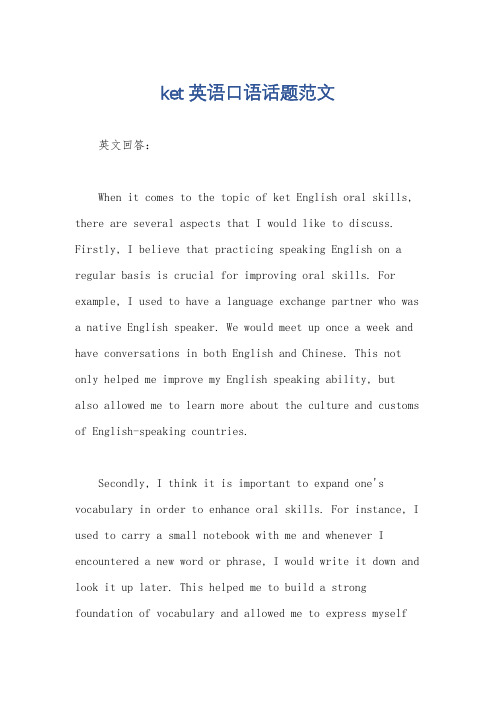
ket英语口语话题范文英文回答:When it comes to the topic of ket English oral skills, there are several aspects that I would like to discuss. Firstly, I believe that practicing speaking English on a regular basis is crucial for improving oral skills. For example, I used to have a language exchange partner who was a native English speaker. We would meet up once a week and have conversations in both English and Chinese. This not only helped me improve my English speaking ability, but also allowed me to learn more about the culture and customs of English-speaking countries.Secondly, I think it is important to expand one's vocabulary in order to enhance oral skills. For instance, I used to carry a small notebook with me and whenever I encountered a new word or phrase, I would write it down and look it up later. This helped me to build a strong foundation of vocabulary and allowed me to express myselfmore fluently in conversations.Furthermore, I believe that listening to and imitating native English speakers is another effective way to improve oral skills. For example, I used to listen to English podcasts and watch English movies with subtitles. This not only helped me improve my pronunciation and intonation, but also allowed me to learn how to use idiomatic expressions and colloquial phrases in the appropriate context.In addition, I think it is important to overcome the fear of making mistakes when speaking English. Many people are afraid of making errors and this often hinders their progress in oral skills. However, I believe that making mistakes is a natural part of the learning process and should not be a cause for embarrassment. For example, I used to be hesitant to speak English in front of others because I was afraid of making mistakes. But once I started to embrace my mistakes and learn from them, my oral skills improved significantly.To sum up, improving ket English oral skills requiresregular practice, expanding vocabulary, listening to and imitating native speakers, and overcoming the fear of making mistakes. By incorporating these strategies into my language learning journey, I have been able to enhance my oral skills and feel more confident in my ability to communicate in English.中文回答:说到ket英语口语技巧,我认为有几个方面值得讨论。
雅思每口语必备句型
雅思每口语必备句型雅思口语必备句型一:“I'm really into...”(我非常喜欢……)这个句型超实用的,可以用来表达自己的喜好。
就像我啊,I'm really into reading detective novels. It's like opening a mystery box every time Istart a new one. You know, the feeling of following the clues and trying to figure out the truth before the end of the book is just amazing. It makes me feel like a smart detective myself.雅思口语必备句型二:“That reminds me of...”(那让我想起……)When we are talking in the IELTS speaking test, this can be a great way to add more details. For example, if the topic is about traveling, I can say, “I once visited Paris. That reminds me of the beautiful Eiffel Tower. Standing under it, I was like a little ant looking at a giant. And the smell of freshly baked croissants in the air, oh my god, it was so wonderful.”雅思口语必备句型三:“I can't help but...”(我忍不住……)This shows a strong feeling or action that you can't control. Suppose the topic is about food. I might say, “When I see a big bowl of ice cream, I can't help but drool. It's like the ice cream is calling my name. My friend always laughs at me when this happens, but I don't care. Ice creamis just too delicious.”雅思口语必备句型四:“It seems to me that...”(在我看来……)It gives your opinion in a gentle way. Let's say the topic is about movies. I could say, “It seems to me that old - time black - and - white movies have a special charm. They are like a window to the past. I watched'Casablanca' once, and I was completely drawn into the story. It made me think about how different love was back then.”雅思口语必备句型五:“You bet!”(当然啦!)This is a very positive and casual way to say yes. For instance, if the examiner asks me, “Do you like music?” I would answer, “You bet! I love all kinds of music. Rock music makes me feel energetic, like I can conquer the world. And classical music is like a gentle breeze on a hot day, calming me down.”雅思口语必备句型六:“What on earth...?”(究竟……?)We can use this to show surprise or confusion. If the topic is about strange customs. I might say, “What on earth is the custom of eating live insects in some cultures? It sounds so gross to me. My sister once told me about it, and I was like, 'Are you kidding me?' But then I realized different cultures have different things.”雅思口语必备句型七:“To be honest...”(老实说……)This helps to make your statement more sincere. Say the topic is about study. I'd say, “To be honest, I find math really difficult sometimes.It's like a big monster hiding in my textbook. I tried to ask my teacherfor help, and he was so nice. He explained things slowly, and I started to understand a bit better.”雅思口语必备句型八:“As far as I'm concerned...”(就我而言……)It's another way to give your personal view. For example, if we are talking about sports. I would say, “As far as I'm concerned, running is the best exercise. It doesn't need any special equipment. Just put on yourshoes and go. It's like a free therapy. Every time I run, I feel all my stress melting away.”雅思口语必备句型九:“I'm dying to...”(我渴望……)Shows a strong desire. If the topic is about future plans. I can say, “I'm dying to travel around the world. I've seen so many beautifulpictures and heard so many interesting stories. It's like there's a fire in my heart. I keep saving money so that I can make this dream come true.”雅思口语必备句型十:“How come...?”(怎么会……?)Used to ask about reasons in a very colloquial way. If the topic is about a strange event. I might say, “How come the dog can understand human language so well? I saw a video of a dog following its owner's commands perfectly. It's like the dog has a secret superpower or something.”In conclusion, these sentences can really help you in your IELTS speaking test. They can make your answers more vivid, natural and engaging.。
coast的近义词,coast的英文是什么
coast的近义词,coast的英文是什么篇一:英语近义词近义词---Wait,AwaitWait(v.)----〝等候〞,〝等待〞.指某事发生之前停留在原地,不采取行动.通常此词作为不及物动词而和for连用.Await(v.)----〝等候〞,〝期待〞.书面语.特指对于断定必来的人或事的不断的期待.后接受词. 例:We can wait here until he comes.我们可以在此地等候他来.How long have you been waiting?你等多久了?How long have you been waiting for me ?你等我多久了?We are an_iously awaiting your reply .我们正焦急地等候你的来临.She was at the door awaiting him.她在门口等候他.--------------------------------------------------------------------------------近义词---Wither, FadeWither(v.)----〝枯萎〞,〝凋谢〞.指因无活力而失去生气.Fade(v.)----〝凋谢〞,〝褪色〞.多指颜色的逐渐消失,有时也作〝暗淡〞讲.例:The flowers have withered away.花凋谢了.Her hopes withered.她的希望渐渐幻灭了.Will this color fade?这颜色会褪吗?The blue rug has faded over the year.那块小蓝地毯经过多年已褪色了.--------------------------------------------------------------------------------近义词---Wild, Fierce, SavageWild(adj.)----〝野蛮的〞,〝未驯服的〞.普通用语.指野性的.无节制的行为,无发怒或严厉之意.Fierce(adj.)----〝凶暴的〞.指易怒的和有凶暴脾气的人或动物.Savage(adj.)----〝野蛮的〞,〝残酷的〞.表示不开化,或缺乏感情的控制力.例:Some wild horses still live in the valley.一些野马还栖息在这个山谷里.Is the sac and Fo_ Indian tribe a wild one?袋与狐部落是野蛮部落吗?He was a fierce fighter.他是一个勇猛的斗士.The fierce robbers come down from the mountains.凶恶的匪徒从山上下来.I have never met such savage manners.我从未见过如此粗暴无礼的举止.He has a savage temper.他性情野蛮.--------------------------------------------------------------------------------近义词---Waste, Garbage, Junk, Refuse, Rubbish, TrashWaste(n.)----〝废物〞.普通用语.指任何被遗弃的东西.Garbage(n.)----〝废物〞.指厨房里丢弃的剩余物.Junk(n.)----〝废物〞.指用坏了地,无价值的废弃物.Refuse(n.)----〝废物,垃圾〞.泛指一切毫无用处,毫无价值的废物或垃圾. Rubbish(n.)----〝垃圾,废物〞.指体积较小.破碎的.没有用的废物,和可收集起来进行处理的弃物,间或指愚蠢无用的话语和思想.Trash(n.)---- 〝废物〞.指小型无价值的杂物,或无价值作品.例:Industrial waste must be prevented from polluting our rivers.必须阻止工业废物污染河流.There is too much waste in this house.这一家人太浪费了.The park is covered with old cans and other forms of garbage.公园里到处都是旧罐头盒和其它各种垃圾.Waiters put their leftovers in the garbage can.侍者把残羹剩饭倒入泔脚桶里.The whole room is full of junk.整个屋子堆满了废弃物品.Their mother enlisted them to remove junk for a trash pickup.他们的母亲在指挥他们清除破烂,好让垃圾车运走.The refuse was unloadedat the city dump.垃圾卸在市垃圾场.Throw the refuse in the garbage can.把垃圾扔进垃圾桶里.The rubbish must be thrown away.这些垃圾必须扔掉.He is talking rubbish.他在说废话.Gather up the leaves and put them with the rest of the trash.把树叶堆积起来,与其它废物放在一起.Don t waste your time reading that trash!别浪费你的时间读那个毫无价值的东西!--------------------------------------------------------------------------------近义词---Walk, Stride, Stroll, PlodWalk(v.)----〝走〞.普通用语.是中性词.指以正常速度走路.Stride(v.)----〝走〞.指大步行走,并且步伐均匀.stroll(v.)----〝走〞.指为了消遣而慢慢地步行.Plod(v.)---- 〝走〞.指缓慢而吃力地走.例:Let us walk in the park for a while.让我们在公园里散会儿步.We got off the bus and walked the last few blocks.我们下了公共汽车,走过最后几个街区.She turned and strode off.她转身大步走开了.The soldiers are striding with a dignified gait.士兵们正昂然阔步而行.They are strolling players.他们是流浪艺人.A huge crowd strolled down Fifth Avenue in the Easter Parade.一大群人在复活节游行时走过第五街.The poor old man plods along,hardly able to lift each food.这可怜的老人吃力地走着,几乎都抬不动脚了.The old horse plodded up the road.老马在路上缓步而行.--------------------------------------------------------------------------------近义词---Waiter,Servant, AttendantWaiter(n.)----〝侍者〞.指饭店,旅馆,餐室里的男侍者.女侍者是waitress.Servant(n.)----〝仆人〞,〝佣人〞.指为工资,膳宿在别人家干活的人.Attendant(n.)----〝仆人〞,侍从〞.指跟随某人并为其服务的人.例:Waiters and waitresses work in restaurants ,hotels, cafe and snack bars.男女服务员在餐馆,旅馆,咖啡馆,快餐馆里招待顾客.While we were waiting for the coffee, the head waiter came up to us bearing a large basket full of huge peaches.当我们在等咖啡的时候,那个领班侍者拎来满满一大蓝子特大的桃子.The millionaire had a staff of 30 servants.这个富翁有仆从30名.In poor countries, live-in servants are present in home not only of the wealthy but also of middle-ciass families.在贫穷国家,不仅富裕家庭,而且中等阶级家庭也有常住的佣人.The queen was always surrounded by her attendants.女王身边总有仆从跟随.The attendants went out backwards.随从倒退着出了房间.--------------------------------------------------------------------------------近义词---Vocal, Oral, Spoken, ColloquialVocal(adj.)---〝发声的〞.指拥有发音的能力.Verbal(adj.)---〝言辞的〞.正式用语.指笔头表达.非正式英语中也表示口头表达. Oral(adj.)---〝口语的〞.指口头表达和交流.Spoken(adj.)---〝口语的〞.指口头表达和交流,此时与oral一词无区别,但spoken可以构成复合形容词,表示以一种特定方式讲话.Colloquial(adj.)---〝口语的〞.指普通的.非正式的通俗语言.例:The snake is not a vocal creature.蛇不是发声动物.He was very vocal in his objections.在反对时他嗓门很大.Let s have oral practice.让我们作口头练习.You had an oral e_amination, didn t you?你考了口试,是吗?This word is used in spoken language.这个词用于口语.She is a soft-spoken woman.她是一个说话柔和的女人.This is a colloquial e_pression.这是通俗用语.He studies English colloquial style.他研究口语体的英语.--------------------------------------------------------------------------------近义词---View, Scenery, Scene, SightView(n.)---〝景色〞.普遍用语.指目中所望见的景色.Scenery(n.)---〝景色〞,〝外景〞.指一个地方乃至一个国家的整个外景或外貌.Scene(n.)---〝景色〞.可与view通用,但多包括了其中的人及其活动.Sight(n.)---〝光景〞.多指人工的事物,比如大建筑史迹等有名的处所.例:There is a fine view of the mountain from our hotel window.从我们旅馆的窗口可以看到秀丽的山景.It was our first view of the ocean.这是我们第一次看见海洋.The scenery of this country is unparalleled.这个国家的风景无与伦比.The train moved slowly south through flat, drab mainline scenery.火车穿过干线两侧风景单调乏味的地区,缓缓地向南驶去.The boats in the harbour make a beautiful scene.港中的船只构成美丽的景色.The scene of sunset was very beautiful.日落的景色是非常美的.We will go and see the sights of New York.我们要去看看纽约的名胜.The Imperial Palace is one of the sights of China.故宫是中国名胜之一.--------------------------------------------------------------------------------近义词---Victory, TriumphVictory(n.)---〝胜利〞,〝战胜〞.主要指战争上的胜利,也指竞赛中所获的胜利.Triumph(n.)---〝大胜〞,〝凯旋〞.指卓越的,一往无前的胜利或成功.例:The victory is not yet decided.胜败尚未决定.The officers led their men to victory in battle.军官们率领士兵在战斗中取得了胜利.We finally won a diplomatic triumph.我们终于赢得了外交的胜利.Perhaps that was to be my greatest moment of triumph!也许那将会成功之最伟大时刻!--------------------------------------------------------------------------------Vibrate, Sway, Swing, RockVibrate(v.)---〝摇动〞,〝震动〞.指一种快速而不断的震动.Sway(v.)---〝摇动〞,〝摆动〞.指有弹力的东西被压弯后又恢复原位的摆动.Swing(v.)---〝摇动〞,〝摆动〞.指任何一头固定而另一头活动的动作,也泛指不正规的动作. Rock(v.)---〝摇动〞,〝摆动〞.指轻微的摇动,也指剧烈的摇摆.篇二:英语近义词辨析英语近义词辨析近义词---Wait,AwaitWait(v.)----〝等候〞,〝等待〞.指某事发生之前停留在原地,不采取行动. 通常此词作为不及物动词而和for连用.Await(v.)----〝等候〞,〝期待〞.书面语.特指对于断定必来的人或事的不断的期待.后接受词.例:We can wait here until he comes.我们可以在此地等候他来.How long have you been waiting?你等多久了?How long have you been waiting for me ?你等我多久了?We are an_iously awaiting your reply .我们正焦急地等候你的来临.She was at the door awaiting him.她在门口等候他.近义词---Wither, FadeWither(v.)----〝枯萎〞,〝凋谢〞.指因无活力而失去生气.Fade(v.)----〝凋谢〞,〝褪色〞.多指颜色的逐渐消失,有时也作〝暗淡〞讲. 例:The flowers have withered away.花凋谢了.Her hopes withered.她的希望渐渐幻灭了.Will this color fade?这颜色会褪吗?The blue rug has faded over the year.那块小蓝地毯经过多年已褪色了.近义词---Wild, Fierce, SavageWild(adj.)----〝野蛮的〞,〝未驯服的〞.普通用语.指野性的.无节制的行为,无发怒或严厉之意.Fierce(adj.)----〝凶暴的〞.指易怒的和有凶暴脾气的人或动物.Savage(adj.)----〝野蛮的〞,〝残酷的〞.表示不开化,或缺乏感情的控制力. 例:Some wild horses still live in the valley.一些野马还栖息在这个山谷里.Is the sac and Fo_ Indian tribe a wild one?袋与狐部落是野蛮部落吗?He was a fierce fighter.他是一个勇猛的斗士.The fierce robbers come down from the mountains.凶恶的匪徒从山上下来.I have never met such savage manners.我从未见过如此粗暴无礼的举止.He has a savage temper.他性情野蛮.近义词---Waste, Garbage, Junk, Refuse, Rubbish, TrashWaste(n.)----〝废物〞.普通用语.指任何被遗弃的东西.Garbage(n.)----〝废物〞.指厨房里丢弃的剩余物.Junk(n.)----〝废物〞.指用坏了地,无价值的废弃物.Refuse(n.)----〝废物,垃圾〞.泛指一切毫无用处,毫无价值的废物或垃圾. Rubbish(n.)----〝垃圾,废物〞.指体积较小.破碎的.没有用的废物,和可收集起来进行处理的弃物,间或指愚蠢无用的话语和思想.Trash(n.)---- 〝废物〞.指小型无价值的杂物,或无价值作品.例:Industrial waste must be prevented from polluting our rivers.必须阻止工业废物污染河流.There is too much waste in this house.这一家人太浪费了.The park is covered with old cans and other forms of garbage.公园里到处都是旧罐头盒和其它各种垃圾.Waiters put their leftovers in the garbage can.侍者把残羹剩饭倒入泔脚桶里.The whole room is full of junk.整个屋子堆满了废弃物品.Their mother enlisted them to remove junk for a trash pickup.他们的母亲在指挥他们清除破烂,好让垃圾车运走.The refuse was unloadedat the city dump.垃圾卸在市垃圾场.Throw the refuse in the garbage can.把垃圾扔进垃圾桶里.The rubbish must be thrown away.这些垃圾必须扔掉.He is talking rubbish.他在说废话.Gather up the leaves and put them with the rest of the trash.把树叶堆积起来,与其它废物放在一起.Don t waste your time reading that trash!别浪费你的时间读那个毫无价值的东西!近义词---Walk, Stride, Stroll, PlodWalk(v.)----〝走〞.普通用语.是中性词.指以正常速度走路.Stride(v.)----〝走〞.指大步行走,并且步伐均匀.stroll(v.)----〝走〞.指为了消遣而慢慢地步行.Plod(v.)---- 〝走〞.指缓慢而吃力地走.例:Let us walk in the park for a while.让我们在公园里散会儿步.We got off the bus and walked the last few blocks.我们下了公共汽车,走过最后几个街区.She turned and strode off.她转身大步走开了.The soldiers are striding with a dignified gait.士兵们正昂然阔步而行.They are strolling players.他们是流浪艺人.A huge crowd strolled down Fifth Avenue in the Easter Parade.一大群人在复活节游行时走过第五街.The poor old man plods along,hardly able to lift each food.这可怜的老人吃力地走着,几乎都抬不动脚了.The old horse plodded up the road.老马在路上缓步而行.近义词---Waiter,Servant, AttendantWaiter(n.)----〝侍者〞.指饭店,旅馆,餐室里的男侍者.女侍者是waitress.Servant(n.)----〝仆人〞,〝佣人〞.指为工资,膳宿在别人家干活的人.Attendant(n.)----〝仆人〞,侍从〞.指跟随某人并为其服务的人.例:Waiters and waitresses work in restaurants ,hotels, cafe and snack bars.男女服务员在餐馆,旅馆,咖啡馆,快餐馆里招待顾客.While we were waiting for the coffee, the head waiter came up to us bearing a large basket full of huge peaches.当我们在等咖啡的时候,那个领班侍者拎来满满一大蓝子特大的桃子.The millionaire had a staff of 30 servants.这个富翁有仆从30名.In poor countries, live-in servants are present in home not only of the wealthy but also of middle-ciass families.在贫穷国家,不仅富裕家庭,而且中等阶级家庭也有常住的佣人.The queen was always surrounded by her attendants.女王身边总有仆从跟随.The attendants went out backwards.随从倒退着出了房间.近义词---Vocal, Oral, Spoken, ColloquialVocal(adj.)---〝发声的〞.指拥有发音的能力.Verbal(adj.)---〝言辞的〞.正式用语.指笔头表达.非正式英语中也表示口头表达. Oral(adj.)---〝口语的〞.指口头表达和交流.Spoken(adj.)---〝口语的〞.指口头表达和交流,此时与oral一词无区别, 但spoken可以构成复合形容词,表示以一种特定方式讲话.Colloquial(adj.)---〝口语的〞.指普通的.非正式的通俗语言.例:The snake is not a vocal creature.蛇不是发声动物.He was very vocal in his objections.在反对时他嗓门很大.Let s have oral practice.让我们作口头练习.You had an oral e_amination, didn t you?你考了口试,是吗?This word is used in spoken language.这个词用于口语.She is a soft-spoken woman.她是一个说话柔和的女人.This is a colloquial e_pression.这是通俗用语.He studies English colloquial style.他研究口语体的英语.近义词---View, Scenery, Scene, SightView(n.)---〝景色〞.普遍用语.指目中所望见的景色.Scenery(n.)---〝景色〞,〝外景〞.指一个地方乃至一个国家的整个外景或外貌.Scene(n.)---〝景色〞.可与view通用,但多包括了其中的人及其活动.Sight(n.)---〝光景〞.多指人工的事物,比如大建筑史迹等有名的处所.例:There is a fine view of the mountain from our hotel window.从我们旅馆的窗口可以看到秀丽的山景.It was our first view of the ocean.这是我们第一次看见海洋.The scenery of this country is unparalleled.这个国家的风景无与伦比.The train moved slowly south through flat, drab mainline scenery.火车穿过干线两侧风景单调乏味的地区,缓缓地向南驶去.The boats in the harbour make a beautiful scene.港中的船只构成美丽的景色.The scene of sunset was very beautiful.日落的景色是非常美的.We will go and see the sights of New York.我们要去看看纽约的名胜.The Imperial Palace is one of the sights of China.故宫是中国名胜之一.近义词---Victory, TriumphVictory(n.)---〝胜利〞,〝战胜〞.主要指战争上的胜利,也指竞赛中所获的胜利. Triumph(n.)---〝大胜〞,〝凯旋〞.指卓越的,一往无前的胜利或成功.例:The victory is not yet decided.胜败尚未决定.The officers led their men to victory in battle.军官们率领士兵在战斗中取得了胜利.We finally won a diplomatic triumph.我们终于赢得了外交的胜利.Perhaps that was to be my greatest moment of triumph!也许那将会成功之最伟大时刻!Vibrate, Sway, Swing, RockVibrate(v.)---〝摇动〞,〝震动〞.指一种快速而不断的震动.Sway(v.)---〝摇动〞,〝摆动〞.指有弹力的东西被压弯后又恢复原位的摆动.Swing(v.)---〝摇动〞,〝摆动〞.指任何一头固定而另一头活动的动作,也泛指不正规的动作. Rock(v.)---〝摇动〞,〝摆动〞.指轻微的摇动,也指剧烈的摇摆.例:The whole house vibrates whenever a heavy lorry passes.每当重型货车经过时,整个房子都会震颤.Dick s heavy footsteps upstairs make the old house vibrate.迪克在楼上沉重的脚步弄得那旧房子直颤动.The branches of the tree swayed in the wind.树枝迎风摇晃.His resolution swayed after the first failure.在第一次失败之后他的决心就动摇了.The pendulum stopped swinging.钟摆停止了摆动.The lantern hanging overhead swung in the wind.吊在高处的灯在风中摇动.Mother is rocking her baby into sleep.母亲在摇她的婴儿入睡.The earthquake rocks houses.地震使房屋震动.Vest, WaistcoatVest(n.)---〝背心〞,〝马甲〞.美国用语.Waistcoat(n.)---〝背心〞,〝马甲〞.英国用语.也用于英国的商业.例:He takes off his coat to reveal a bright red vest.他脱下上衣,露出一件鲜红的马甲.Jimmy is wearing a vest under a coat.吉米在上装里面穿着一件背心.The sleeves of a pale blue waistcoat came only to her elbows.一件淡蓝色马甲的袖子只垂到了她的臂弯处.He left off his waistcoat as soon as he came into the room.他一进屋就脱掉了他的马甲.Vessel, ContainerVessel(n.)---〝容器〞.指盛装液体的用具.Container(n.)---〝容器〞.指盛装固体或液体的日常用具.例:A heat e_changer, in a narrow sense, is a vessel.从狭义来说,换热器是一种容器.He began putting the sacred vessels away.他开始把供热器收拾起来.篇三:英语近义词辨析英语近义词辨析--------------------------------------------------------------------------------Wait,AwaitWait(v.)----〝等候〞,〝等待〞.指某事发生之前停留在原地,不采取行动.通常此词作为不及物动词而和for连用.Await(v.)----〝等候〞,〝期待〞.书面语.特指对于断定必来的人或事的不断的期待.后接受词. 例:We can wait here until he comes.我们可以在此地等候他来.How long have you been waiting?你等多久了?How long have you been waiting for me ?你等我多久了?We are an_iously awaiting your reply .我们正焦急地等候你的来临.She was at the door awaiting him.她在门口等候他.---------------------------------------------------------------------------------Wither, FadeWither(v.)----〝枯萎〞,〝凋谢〞.指因无活力而失去生气.Fade(v.)----〝凋谢〞,〝褪色〞.多指颜色的逐渐消失,有时也作〝暗淡〞讲.例:The flowers have withered away.花凋谢了.Her hopes withered.她的希望渐渐幻灭了.Will this color fade?这颜色会褪吗?The blue rug has faded over the year.那块小蓝地毯经过多年已褪色了.-----------------------------------------------------------------------------------Wild, Fierce, SavageWild(adj.)----〝野蛮的〞,〝未驯服的〞.普通用语.指野性的.无节制的行为,无发怒或严厉之意. Fierce(adj.)----〝凶暴的〞.指易怒的和有凶暴脾气的人或动物.Savage(adj.)----〝野蛮的〞,〝残酷的〞.表示不开化,或缺乏感情的控制力.例:Some wild horses still live in the valley.一些野马还栖息在这个山谷里.Is the sac and Fo_ Indian tribe a wild one。
晚枫口语发音(Colloquial pronunciation of late maple)
晚枫口语发音(Colloquial pronunciation of late maple)Example of long vowel [i:]: (Note: primary vocabulary is represented by P - primary, middle and advanced vocabulary is represented by A - Advanced; blue phonetic transcription is British pronunciation, and red is American pronunciation. )P1) the word at the beginning of the [i:]Eat [i:t] eat East, [i:st], Orient, each, [i:t...] every even ['i:v, n], evenEasy ['i:si] easy evening ['i:vni?] night eagle, ['i:gl], eagle, evil, ['i:vl], evil ()P2) a monosyllabic word ending with [i:]Tea [ti:] me [mi:] I (accusative) tea bee [bi:] see [si:] saw the beesHe [hi:], he key [ki:] keys she [[i:]], she we, [wi:] usKnee [ni:] knees, be [bi:] is pee, [pi:] pee, free [fri:] freeThree [theta, ri:], three, tree, [tri:], tree, sea, [si:] sea(P3) monosyllabic wordsMeet [mi:t] meets sleep, [sli:p] sleeps, meat [mi:t] meat, keep [ki:p] keepsGreen, [gri:n], green, bean, [bi:n] beans, leaf, [li:f] leaves,feel, [fi:l] feelingSheep [i:p] sheep, sweet, [swi:t], sweet clean, [kli:n], clean beach, [bi:t] BeachRead [ri:d] read cheap [t, i:p] cheap teeth, [ti: theta] teeth (plural) field [fi:ld] fieldsQueen, [kwi:n], Queen, teach, [ti:t,] teach need [ni:d] requires these [ei:z] theseReach [ri:t?] arrive at lead [li:d], lead week [wi:k] week heat [hi:t] hotPlease [pli:z], please seat seat [si:t](P4) disyllabic wordsPeanut, ['pi:n, t], peanuts, feeling, ['fi:li,...] feel kiwi, ['ki:wi:], kiwi, Chinese, ['t, ai'ni:z], ChineseSecret, ['si:krit], secret, beetle, ['bi:tl], beetle, agree, ['gri:], ['pi:pl], people, peopleIce-cream ['aiskri:m] ice cream zebra ['zi:br?,'zebr?] season ['si:zn] eighteen ['ei'ti:n] eighteen season zebraThirteen [theta:'ti:n] thirteen, fever, ['fi:v] [fever, teacher, ['ti:t?] ['ti:t?] teacher sixteen ['siks'ti:n] sixteenA1) the word that begins with [i:]Eel, [i:l], eel, ease, [i:z], comfort, equal, ['i:kw, l], Eve, [i:v], Eve, Eve, Xia WaEager ['i:g ego] ['i:g ['i:g u] self Easter ['i:st] ['i:st Easter Eden ['i:dn] EdenA2) a monosyllabic word ending with [i:]Wee [wi:], minimal Zee [zi:, zed],, Z, flee, [fli:], fleas, escape, glee, [gli:], joy, joyFee [fi:] fee pea [pi:] pea plea [pli:] beg request GEE [d i:] God (exclamation) forward right(A3) monosyllabic wordsDeal [di:l] deals peel, [pi:l] peels peeled, feed [fi:d] feeds, bleach [bli:t?] bleach (agents)Leap [li:p] jump tease [ti:z] tease tease breeze [bri:z] breeze yield [ji:ld] production surrenderHeap, [hi:p], stream, [stri:m], stream, stream, scream[skri:m], scream, lease, [li:s], rent(A4) disyllabic wordsMedia ['mi:di?] media indeed [in'di:d] is indeed the highest treatment ['tri:tm nt] treatment Supreme [sju:'pri:m]"Zebra, ['zi:br,...] zebra complete [k m'pli:t] reveal,[ri'vi:l] reveals creature ['kri:t? ['kri:t] biological animal people."Receive [ri'si:v] received the receptionAn example of a short vowel:P1) with the beginning of the monosyllabic wordIt [it], it's in, [in] in... Ill [il] ill if [if] ifIs [iz] is its [its], its ink [i, k] ink, Inn [in] Inn(P2) monosyllabic wordsFit [fit] fits (SIT) [sit], sits hit [hit], hits lid [lid] lidShip [[ip] ship this [eis]] this will [wil] will be willing to quick [kwik] fastPick [pik] pick strict, [strikt] strict wind, [wind] wind think [theta I, k] think(P3) disyllabic words听[ 'lisn ]听分钟[ 'minit ] [ 'din分钟晚餐吗?] [ 'din?晚餐手指]【脊椎动物?G?】【脊椎动物?G?手指]小[ 'litl ] [ 'wind小的窗口?你窗图片] [ 'pikt??] [ 'pikt?图画?] [ 'wint冬天?] [ 'wint?冬季]P4)多音节词,注意的变音??[ di'li好吃吗?可口的?]?家庭[ f?家庭木里]?电影[ 'sinim?电影院]?能力[?]能力极限]历史[ 'histri ] [ 'hist?日] [ 'dik历史字典吗??N?日] [ 'intristi字典有趣吗?有趣的]?[ bi'gin初学者吗?][ bi'gin?初学者]A1)以重读音节开始的词成语【'idi?成语[M],习语图像[ 'imid?图像意象说明],[ 'il?该举例说明屋] [:]圆顶建筑'iglu[“无辜?无辜的SNT ] [ 'implim实施?新台币]实施移民[ ] [ ] 'imigreit移居入境无限的无限(的)A2)以轻读音节开始的词斜体字[不是吗?莱克]斜体的意味着[ im'plai ]暗示点燃[ ig'nait ]点燃立即[ i'mi:DJ吗?立即T ][ i'sen必不可少?必要的?] [ ] [消除i'limineit消除不可抗拒?iri'zist?BL不可抵抗的急救[我]?:D?NSI ] [我?D?紧急情况NSI ]A3)双音节单词,注意的变音??[ bi'j之外?超过钕]?女性'feminin ] [女性的?[ bi'l下面吗?u ]在…下面垃圾[ 'lit?] [ 'lit?] [ 'hip乱丢垃圾河马?你河马万] [ 'milj?n ]百万辣椒[不?伊犁] [ 'mitn ]连指手套辣椒手套A4)多音节词,注意的变音??[ 'digniti ]尊严尊严?资格[?ELID??'biliti ]资格?[ 'eliveit电梯?] [ 'eliveit?] [ ai'tin电梯行程?R?日,我不旅程][的]明确明确的重力[ 'gr?维蒂]重力三位一体[ 'triniti ]三位一体?[ fleks'biliti ]灵活性灵活性?可能性[?P?si'biliti ]可能性三[我]和在单词中的字母和字母组合字母E,我;字母组合EE,EA,EI,即他们都可以发[我]的音。
英语口语辨析:good on you 还是 good for you ?
英语口语辨析:good on you 还是 good for you ? 'Good on You' Comes from Australia“Good on You”来自澳大利亚英语The New Partridge Dictionary of Slang says good on you is an Australian phrase dating back to 1907. Anecdotally, two Australian commenters on the LinkedIn page said that good on you is the standard phrase in that country, but oneAustralian dissenter said that although good on you is common, it is still viewed as slang. [/en]《新帕特里奇俚语词典》中写道,“good on you”是一个澳大利亚短语,能够追溯到1907年。
据说,两位澳大利亚籍评论员在领英页面上称“good on you”在他们国家是标准用语,但是一位持反对意见的人则表示虽然“good on you”使用普遍,但仍然属于俚语。
[en]The Concise English Dictionary labels good on you "Australian colloquial."《简明英语词典》将“good on you”标注为澳大利亚口语。
What Does 'Good on You' Mean?“Good on You”是什么意思?Anna Wierzbicka, of the Department of Linguistics atAustralian National University, writes in Semantics, Culture, and Cognition: Universal Human Concepts in Culture-Specific Configurations that the phrase good on you is a working-class expression and reflects Australians' deep seated optimism.She says that although good on you is often interchangeable with congratulations or good job, it also has a different meaning: you may say good on you to a friend who hasannounced he will fight a difficult illness, for example—a situation in which congratulations or well done would be inappropriate.澳大利亚国立大学语言学部的安娜·维尔比卡在《语义,文化与认知:特殊文化格局中人类的普遍认知》一书中写道,“good on you”是工人阶级常用的表达,反映了澳大利亚人根深蒂固的乐观态度。
- 1、下载文档前请自行甄别文档内容的完整性,平台不提供额外的编辑、内容补充、找答案等附加服务。
- 2、"仅部分预览"的文档,不可在线预览部分如存在完整性等问题,可反馈申请退款(可完整预览的文档不适用该条件!)。
- 3、如文档侵犯您的权益,请联系客服反馈,我们会尽快为您处理(人工客服工作时间:9:00-18:30)。
常用口语(Colloquial English) 从事[在ɡ开斋节吗?D ]
占线信号:占线信号|忙音|示忙信号 你订婚了吗? B:不,先生。你好,我能帮你吗? 我想分享公司。 B:哦,跳进去。 -有人预定了你的车吗? -没有,先生。您要车吗? -去沙玲公司。 -上车吧。 请送我去甘乃迪机场。 不远处。在那边。 请送我去肯尼迪机场。 -不远,就在那儿。 我想去附近的城市,如果你不介意的话。 ——如果你不介意,我想看看街景 我要去拜访一位朋友。 我要看一位朋友。 这条路对吗? 我们的路线对吗? 请带我去伦敦饭店。 B:好的。我们什么时候到那里? 一:尽快,因为我有一个重要的会议 参加。 B:好吧,如果没有阻塞的话。 -请送我去伦敦饭店。 -好吧,什么时候到? -越快越好,我要参加一个重要会议。 ——好吧,只要路上不停车就行。 请派一辆出租车到格兰德酒店。 B:请问你的地址? A:162大街六号。 B:你什么时候要这个服务? 答:4点30分。谢谢. -请派辆出租车到格兰德饭店。 -您的地址是......? -第六大街162号。 -什么时候要车? 4:30,谢谢。 我该付你多少钱? B:四美元五十美分。 答:这是五美元,你可以改变。 B:谢谢你。 -我该付多少钱? 4.5美元。 -给你5美元,零头不用找了。 -谢谢。 不用谢.没关系,别客气。 谁知道!天晓得! 没什么了不起。没什么了不起! 容易做到。慢慢来。 别逼我。别逼我。 这是紧急的。有急事 神的工作。上帝的安排。 希望如此。希望如此。 开始做生意。言归正传。 不关我的事。不关我事。 我不在乎.我不在乎没有那么坏。不错。 没有办法!不可能! 别恭维我。过奖了。 欢迎你。你太客气了。 这是一个很长的故事。一言难尽。 我们之间。你知,我知。 大嘴巴!多嘴驴! 当然!当然! 我这就去。我这就去。 不要介意.不要紧。 可以-做。能人。 闭上-。特写镜头。 放弃它!停止! 瓶!闭嘴! 别装死!别装蒜! 化妆!不记前嫌! 注意你的嘴巴。注意言辞。 有急事吗?有急事吗? 出去吃怎么样?外面吃饭怎样? 别做过头了!别太过分了。 你懂吗?你搞明白了吗? 恐怕不行,我恐怕不能。 你想打赌吗?你想打赌吗? 我替你去怎么样?我替你去怎么样? 谁想要?谁稀罕? 十二月的心跳。黄昏恋。 我凭直觉做事。凭直觉做某事。 吝啬鬼!小气鬼! 见鬼去吧!去死吧! 过来坐这儿。来这边坐。 祝你好运!祝你好运! 画蛇添足。画蛇添足。 成功.达到目的,获得成功。 我会见到你的。再见。 他有一把斧子要磨。他另有企图。 我想如果你能送我一程吗?能让我搭一程吗? 下雨了。要下雨了。 我可以要这个吗?。可以给我这个吗? 我可能听到大头针落地。非常寂静。 你为什么这么肯定?怎么这样肯定? 是这样的吗?是这样吗? 别装了。别喝醉了。 离他远点。别靠近他。 不要戴高帽子。别摆架子。 就在那里。就在那里。 打包袋。打包袋。 铃声响了。听起来耳熟。 双耳睡觉。睡的香。 逃学。旷工、旷课。 你有没有钱?你身上带钱了吗? 你的专业是什么?你学什么专业? 我和女朋友分手了。我和我的女朋友吹了。 这是曾经发生过的事。 蓝色的月亮。这是千载难逢的事。 这是一个问题!一言为定! 我会踢你的屁股。我将炒你鱿鱼。 晚饭我请。晚饭我请。 替我向大家问好。替我向大家问好。 不精确!不见得,不一定! 那是不公平的。这不公平! 我们没办法。我们没办法。 那太好了。太棒了! 不客气!别客气! 爆炸!妈的! 男孩!(表示惊奇,兴奋等)好家伙哇! 从这出去滚出去! 我不能使收支平衡。我上个月接不到下个月,缺钱。 它可能是一个杀手。这是个伤脑筋的问题。 死胡同。死胡同。 坐下!请坐! 在这里,你们!说得对! 你要求它!活该! 这怎么可能呢?真想不到! 新鲜的油漆!油漆未干! 他推运气。他太贪心了。 我当家。我当家。 它在空中。尚未确定。 配菜。配菜。 我洗耳恭听。我洗耳恭听。 临阵退缩。害怕做某事。 真为你高兴!好得很! 前进.继续。 帮帮我。帮帮我。 先把它搁置一旁。先把它搁一边。 失去了头。丧失理智。 说真的。有话直说。 他真让人讨厌。他真让人讨厌。 你有吸管吗?你有吸管吗? 当然!一定,当然! 那是个男孩!太好了,好极了! 这取决于你.由你决定。 线路正忙。占线。 我全力支持你。我现在很忙。 不要捏造事实。不要捏造事实。 小别胜新婚。小别胜新婚。 她把事情搞得一塌糊涂。她把事情搞得一塌糊涂。 看个够。看个够。 他的眼睛很锐利。他的眼睛很锐利。 拍摄微风。闲谈。 告诉我什么时候!随时奉陪! 世界真小!世界真是小! 一点也不.根本就不(用)。 让我们见机行事。让我们随兴所至。 等着瞧!等着瞧。 为什么这么忧郁?怎么垂头丧气? 你怎么来了?什么风把你吹来了? 坚持!抓紧(别挂电话)! 别管我.别理我。 引体向上。不气,振作些。 你永远不知道。世事难料。 高杰克!举起手来(抢劫)! 她为什么要嫁给一个年龄够大的男人? 是她的父亲吗?她为什么要嫁给一个年龄与她父亲相当的男人? 我大多数时间都在家里。我多半在家里。 她几分钟后就会来。他马上会过来。 我不是一个好心情。没有心情(做某事)。 他是个吹牛大王。他是个吹牛大王。 我无聊的要死。我无聊死了。 干杯!干杯! 大胆的!亲爱的! 我们到了。我们到了! 我迷路了。我迷路了。 她还在生我的气。她还在生我的气。 我总有一天跟他扯平我总有一天跟他扯平。 撞天花板。大发雷霆。 她身怀巨款。她身怀巨款。 我没有地方可待。没地方可去。 我很想见你。我很想见你。 我以上帝起誓。我对天发誓。 什么猫腻。别耍花招。 你至少得道个歉。你顶多道个歉就得了。 物价飞涨,如果再这样下去,我们就不能维持这种局面了。 物价直线上升,这样子下去,我们锅里可没什么东西煮饭。 你没有钥匙孔。不准偷看。 来吧,理智点。嗨,你怎么不讲道理。 你什么时候离开?你什么时候走? 你不能这么说。未必吧,不至于这样吧。 别误会我了。别误会我。 你似乎不完全是你自己的你今天看起来不大对劲今天。 我不得不迟到,让我的约会等着。我不喜欢迟到而让别人久等。 你介意少点声音吗?。能不能小声点。 这不会占用你太多时间。这不花你好多时间。 从长远来看。从长远来说不是这样的。 它质量上乘。它质量上乘。 这里没有这个人。这里没有这个人。 他既不喝酒也不抽烟。他既不喝酒也不抽烟。 违反规则。违反规则。 你有多大?!你真棒! 可怜的东西!真可怜! 坚果!呸;胡说;混蛋 经典英文赞美别人 1。你今天看上去真棒。 (你今天看上去很棒。)】【每天都可以用! 2。你干得很好。 (你干得非常好。)】【国际最通用的表扬! 三.我们十分为你骄傲。 (我们十分为你骄傲。)】【最高级的表扬! 4。我对你的工作很满意。 (我对你的工作非常满意。)】【真诚的赞扬! 5。这真是个好地方。 (这真是个好地方!)】【效果很好的表扬! 6。你看起来很帅! (你看上去真精神/真棒/真漂亮。)】【与众不同的表扬! 7。你总是知道该说什么。 8。你总是说话得体。 (你总是说话得体。)】【高层次的表扬! 9。做的好!你做得很好。 (干得好!)】【极其地道的表扬! 10。这菜很好吃。 (好吃!)】【最普通、但非常重要的表扬! 11。每样东西都很美味。 (每样东西都很美味!) 12。你的儿子/女儿真可爱。 (你的孩子很可爱。) 13。多么可爱的孩子! (多么可爱的孩子。)】【只管大胆用! 14。我钦佩你的工作。 15。我尊重你的工作。 我对你的工作表示敬意。)】【世界通用! 16。你的个性很好。 (你的个性很好。)】【一个非常安全的表扬! 17。你真幽默。 (你真幽默。)】【美国人极其喜欢的表扬! 18。你的中文令人惊讶。 (你的中文令人惊讶。) 19。我真不敢相信你的英语。 (我真不敢相信你的英语。)】【用了六星级形容词! 20。你的事业很成功。 (你的事业很成功。 21。你非常专业。 (你非常专业。)】【专业化的表扬! 22。你的公司给我留下深刻的印象。 (你的公司给我留下深刻印象。) 23。你非常聪明。 (你非常聪明。) 24。我非常羡慕你。 (我非常羡慕你。) 25。你的妻子很有魅力。 (你的妻子很有魅力!) 26。你们真是天生的一对。 (你们真是天生的一对!) 27。你很有天赋。 (你很有天赋。) 28。你穿那种颜色很好看。 (你穿那种颜色很好看。) 29。你还挺有品位的呦。
